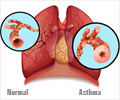Taking vitamin D supplements does not lessen the incidence of asthma attacks in children or adults, according to an updated Cochrane review.
- Previous studies suggested that vitamin D either prevents asthma attacks or improves asthma symptom control
- However, researchers have now revealed that there is no effect of taking vitamin D on asthma control
- The research did not involve many people with severe asthma or those with very low amounts of vitamin D in their blood. Therefore, more study is needed in these areas
Does Vitamin D Supplementation Reduce the Risk of Asthma Attack
The review was carried out by researchers from Queen Mary University of London and the University of Edinburgh. Researcher Adrian Martineau, Clinical Professor of Respiratory Infection and Immunity at the Queen Mary University of London, said, “Vitamin D deficiency has been linked to an increased risk of severe asthma attacks and our previous Cochrane review, published in 2016, found that vitamin D reduced the risk of asthma attacks. However, more studies have been published since then and when we included the extra data in our updated review, the overall results changed. We found that vitamin D supplements did not affect the risk of asthma attacks or control of asthma symptoms compared with a placebo.”When the researchers compared patients who were given a vitamin D supplement to patients who were given a placebo (dummy drug), they discovered no statistically significant difference in the number of participants who had an asthma episode that required treatment with a course of steroid pills.
Vitamin D Does not Benefit Asthma Management
The review found no benefit of taking vitamin D on asthma management, even when participants were vitamin D deficient at the start of the research, when different doses of the supplement were used, or when people were of different ages."In contrast to our previous Cochrane analysis on this topic, this revised review does not find that vitamin D gives protection against asthma attacks or improves control of asthma symptoms," said Professor Martineau. However, the trials we looked at did not involve many patients with severe asthma or with very low levels of vitamin D in their blood, so further study is needed in these areas.
Anne Williamson, the first author of the study who is also from the Queen Mary University of London, commented, “We can’t be certain why this updated review has given a different result to our original study from 2016. It could be that people with asthma may be getting better treatment than previously. Or it could be that, in general, rates of vitamin D deficiency have decreased over time, due to increased intake of supplements or fortified foods. Either of these factors could obscure the potential benefits of taking vitamin D supplements. Regardless of the reason, these most recent findings are likely to be correct for people living with asthma today. This also highlights why it’s vital to update reviews when more research is published.”
The data in today's study come from 20 clinical trials, compared to nine in the prior review, and children with asthma are better represented than before. In comparison to past evaluations, the review team claims to have applied tougher criteria for which studies will be included. They rejected trials that did not compare vitamin D to a placebo, as well as those that did not follow patients for at least 12 weeks.
Source-Medindia
















